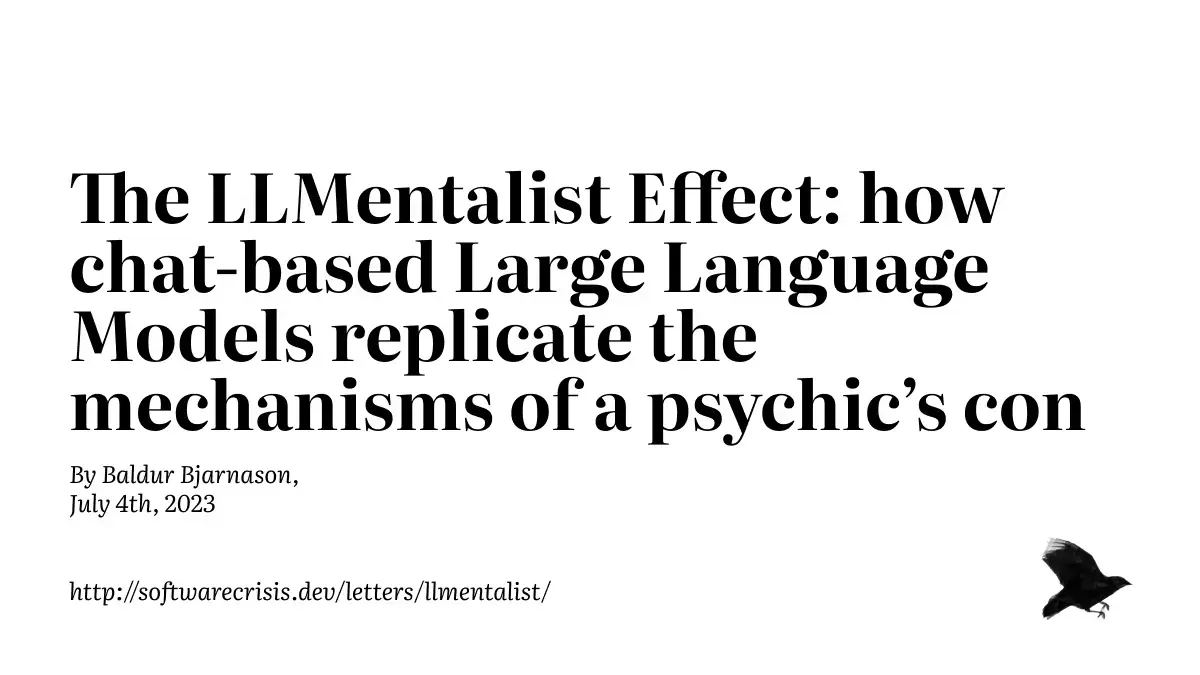That’s a good text. I’ve been comparing those “LLM smurt!” crowds with Christian evangelists, due to their common usage of fallacies like inversion of burden of proof, changing goalposts, straw man, etc.
However it seems that people who believe in psychics might be a more accurate comparison.
That said LLMs are great tools to retrieve info when you aren’t too concerned about accuracy, or when you can check the accuracy yourself. For example the ChatGPT output of prompts like
- “Give me a few [language] words that can be used to translate the [language] word [word]”
- “[Decline|Conjugate] the [language] word [word]”
- “Spell-proof the following sentence: [sentence]”
is really good. I’m still concerned about the sheer inefficiency of the process though, energy-wise.
But there isn’t any mechanism inherent in large language models (LLMs) that would seem to enable this and, if real, it would be completely unexplained.
There’s no mechanism in LLMs that allow for anything. It’s a blackbox. Everything we know about them is empirical.
LLMs are not brains and do not meaningfully share any of the mechanisms that animals or people use to reason or think.
It’s a lot like a brain. A small, unidirectional brain, but a brain.
LLMs are a mathematical model of language tokens. You give a LLM text, and it will give you a mathematically plausible response to that text.
I’ll bet you a month’s salary that this guy couldn’t explain said math to me. Somebody just told him this, and he’s extrapolated way more than he should from “math”.
I could possibly implement one of these things from memory, given the weights. Definitely if I’m allowed a few reference checks.
Okay, this article is pretty long, so I’m not going to read it all, but it’s not just in front of naive audiences that LLMs seem capable of complex tasks. Measured scientifically, there’s still a lot there. I get the sense the author’s conclusion was a motivated one.
There is no reason to believe that it thinks or reasons—indeed, every AI researcher and vendor to date has repeatedly emphasised that these models don’t think.
Geoffrey Hinton, for one
Can someone please paraphrase the following which I didn’t understand?
Somebody raised to believe they have high IQ is more likely to fall for this than somebody raised to think less of their own intellectual capabilities. Subjective validation is a quirk of the human mind. We all fall for it.
But if you think you’re unlikely to be fooled, you will be tempted instead to apply your intelligence to “figure out” how it happened. This means you can end up using considerable creativity and intelligence to help the psychic fool you by coming up with rationalisations for their “ability”.
And because you think you can’t be fooled, you also bring your intelligence to bear to defend the psychic’s claim of their powers. Smart people (or, those who think of themselves as smart) can become the biggest, most lucrative marks.
The author’s suggesting that smart people are more likely to fall for cons that they try to dissect but can’t find the specific method being used, supposedly because they consider themselves to be infallible.
I disagree with this take. I don’t see how that thought process is exclusive to people who are or consider themselves to be smart. I think the author is tying himself into a knot to state that smart people are actually the dumb ones, likely in preparation to drop an opinion that most experts in the field will disagree with.
It’s not a take though, it’s a thing. The tendency to fall into irrational beliefs has been called “Dysrationalia” in psychology and is linked to higher education and intelligence. An example would be the tendency of Nobel prize winners to espouse crazy theories later in life, which is humourously referred to as the Nobel Disease.
That’s a 1 month old thread my man :P
But sounds interesting, I haven’t heard of Dysrationalia before. Quick cursory search shows that it’s a term that has been coined mostly by a single psychologist in his book. I’ve been able to find only one study that used the term and it found that “different aspects of rational thought (i.e. rational thinking abilities and cognitive styles) and self-control, but not intelligence, significantly predicted the endorsement of epistemically suspect beliefs.”
https://www.ncbi.nlm.nih.gov/pmc/articles/PMC6396694/
All in all, this seems to me more like a niche concept used by a handful of psychologists rather than something widely accepted in the field. Do you have anything that I could read to familiarize myself with this more? Preferably something evidence-based because we can ponder on non-verifiable explanations all day and not get anywhere.
That’s a 1 month old thread my man :P
Not sure what you mean. The thread was created August 16, my comment was made August 21, and now here you are replying on September 24. Some fediverse hiccup maybe.
So anyways I don’t have anything a cursory search wouldn’t turn up.
Oh damn, you’re right, my bad. I got a new notification but didn’t check the date of the comment. Sorry about that.
I don’t see how that thought process is exclusive to people who are or consider themselves to be smart.
They aren’t saying that this is exclusive to people who consider themselves smart. They’re saying that they’re more likely to fall for the trap by engaging with the assumption of not being susceptible to being tricked. Although I think the author does conflate smart people with people who think of themselves as smart inappropriately.






